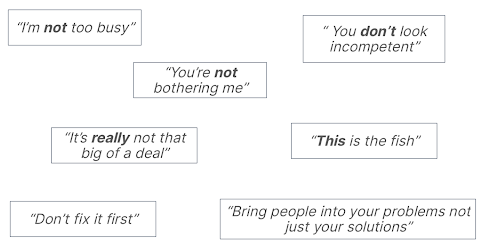You should share more bad news. Here’s why.
When leaders set out to create a mission-driven culture, they often invoke practices like weekly all-hands meetings, virtual happy hours, or more intentional onboarding.
While these initiatives are great, they can sometimes feel like box-checking exercises when they’re not motivated by the right intentions.
What truly drives culture are the daily practices and behaviors that bring your mission to life.
So what are those daily habits?
At Leadr, we emphasize “behavioral norms” to ensure our values are lived out daily. One key norm we follow is no surprises.
This is not something that comes naturally. It’s 180 degrees different than other workplaces where it’s normal to bury bad news and promote good news.
So why ‘no surprises’?
Because trust is built on transparency, and as the saying goes, “people move at the speed of trust.”
The goal is to front-foot the bad news promptly so that you can focus on changing and improving.
Here are some reasons why we DON’T share proactively. We think:
But the reality is:
Let's lay out some of the principles of a ‘no surprises’ culture:
Bad news should travel fast.
Bad news is good news. Because once you get it out, you can start to work on solving it.
More communication = more autonomy.
Don't spin it, just report the reality. You can work out all the reasons and excuses why later.
If your manager is asking, you’re already behind.
If you're not communicating frequently with your manager, your team, or others, there's probably an expectation gap.
Just because you’re passing on bad news doesn't reduce anyone's confidence in you. In fact, I’ve always found the opposite. It INCREASES trust and confidence.
So why does all of this really matter?
Because trust is mission-critical if you want a mission-driven organization.
Because asking for help is a great sign that you’re more focused on the team's success than your own.
Because speed is a competitive advantage.
The faster you can pivot and adjust, the better experience your customers will have and the faster you’ll reach your mission.
Here's my challenge for you this week: move the dial about 25% further towards over-communication, so you can bridge gaps, align teams, and strengthen trust.
Lead on.
Thanks for reading,
MT


